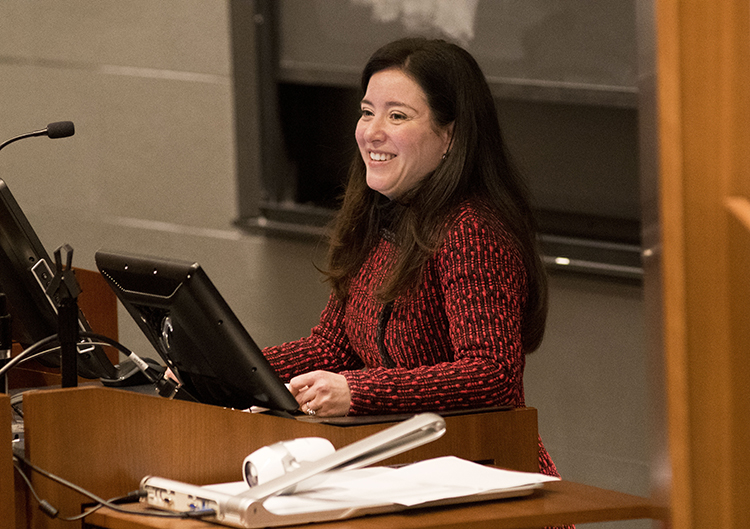This website uses cookies
We use cookies to ensure that we give you the best experience on our website. If you continue to use this site we will assume that you are happy with it.
In 2011, Carmen Segarra ’98 was hired as a bank examiner at the Federal Reserve Bank of New York and assigned to a team of specialists evaluating compliance policies at the country’s most powerful financial institutions.

Carmen Segarra, J.D. ’98 speaks about her book at Myron Taylor Hall.
While evaluating Goldman Sachs, Segarra discovered that the investment banking firm did not have a companywide conflict-of-interest policy. But when she raised concerns about this to her supervisors at the New York Fed, she says they tried to obstruct her investigation.
“I was asked to delete evidence I had gathered from the record, which by the way is a crime,” Segarra said in a talk at Myron Taylor Hall on April 10. “I refused. My job was to protect the American people. My job was not to protect Goldman Sachs.”
In 2012, seven months after she was hired at the agency, Segarra was fired, which led her to file a lawsuit for wrongful termination. The case was dismissed by the U.S. District Court for the Southern District of New York and affirmed by the U.S. Court of Appeals for the Second Circuit in 2014.
After her dismissal, Segarra released audio recordings she had taped between the regulators from the Fed and the bank, which were featured in reports in ProPublica and on the radio show This American Life. The forty-six hours of audio prompted hearings in the Senate Committee on Banking, Housing and Urban Affairs on the issue of regulatory capture, the theory that regulatory agencies may become dominated by the industries they are charged with regulating.
Now a lawyer in private practice, Segarra wrote about her experience in the book, Noncompliant: A Lone Whistleblower Exposes the Giants of Wall Street (Bold Type Books, 2018), which received widespread media attention.
Segarra told the students that Cornell Law School is the ideal place to learn how to make decisions that uphold the principles of law. “Ultimately what I relied on were the skills and lessons I learned when I was here and had the time to reflect on how to make choices,” she said.
The decisions law students make, however, become increasingly complex once they graduate and face ethical choices in their practice on a daily basis, she said.
“When you’re a student, you have a choice—you can say, ‘I can choose whether or not to go to school or whether or not to read the assignments,’” she said. “But then it gets a little harder than whether I have read the assignment. Do I overbill this client for work?”
Making ethical choices, she said, “are like the road not taken. They allow you to enter the space of real, true freedom of expression. It really does help you define yourself and it tells you who you are.”
Stewart Schwab, the Jonathan and Ruby Zhu Professor of Law, told the students that he predicted that they would face a “real ethical dilemma” at some point in their legal career. The most difficult choice, he added, is to resist the temptation that “everybody seems to be doing it this way,” when you believe that way is unethical or illegal.
“Hopefully the training that you’ve received at the law school will help you do the right thing,” said Schwab, the former Allan R. Tessler Dean of the Law School, “even when it’s hard to figure out what is the right thing.”